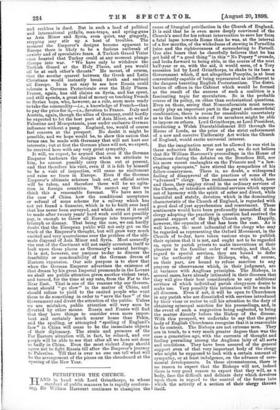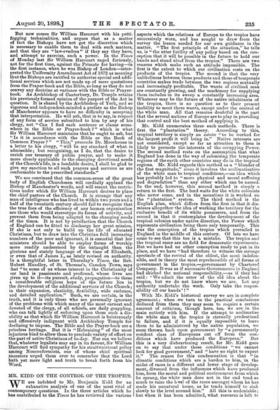PETRIFYING THE CHURCH.
:RAND in hand with Lord Grimthorpe, to whose .standard of public manners he is rapidly conform- ing, Sir William Harcourt continues to champion the cause of liturgical petrifaction in the Church of England. It is said that he is even more deeply convinced of the Church's need for his robust intervention to save her from a fatal lapse towards Rome than he was, at the interval of a few months, of the wickedness of stewing in Parnellite juice and the righteousness of surrendering to Parnell. One also hears that he cheerfully believes that he has got hold of "a good thing" in this "No Popery" crusade, and looks forward to being able, in the course of the next half-year or so, with the aid, it would seem, of a Tory secession led by Lord Grimthorpe, to shake to its base a Government which, if not altogether Puseyite, is at least conveniently capable of being represented as indifferent to the dangers besetting English Protestantism. The distri- bution of offices in the Cabinet which would be formed as the result of the success of such a coalition is a fascinating topic for speculation. So is the probable course of its policy, on other than ecclesiastical questions. Even on those, seeing that Nonconformists must neces- sarily play an important part in the great anti-sacerdotal combination, there is room for considerable uncertainty as to the lines which some of its members might be able to impose on others. Lord Grimthorpe, as Lord President, conducting a Welsh Disestablishment Bill through the House of Lords, as the price of the strict enforcement of a new and coercive Uniformity Act within the Church of England, would excite universal interest.
But the imagination must not be allowed to run riot in these seductive fields. For our part, we do not believe that Sir William Harcoures proceedings in the House of Commons during the debates on the Benefices Bill, nor his more recent onslaughts on the Primate and "a law- evading episcopate," have stirred the sympathies of his fellow-countrymen. There is, no doubt, a widespread feeling of disapproval of the practices of some of the "advanced" clergy. The recklessness with which, here and there, they employ ritual in the ordinary services of the Church, or introduce additional services which appear out of harmony with the spirit of sober and direct, while beautiful and stately, devotion which is the dominating characteristic of the Church of England, is regarded with a good deal of just apprehension and resentment. These sentiments would have been profoundly intensified if the clergy adopting the practices in question had received the general support of the High Church party. Happily, however, the opposite of that has been the case. As is well known, du most influential of the clergy who may be regarded as representing the Oxford Movement, in the Church of to-day, have taken various steps to publish their opinion that it is not, and ought not to be regarded as, open to parish priests to make innovations at their pleasure in the familiar order of worship, and that, in regard to special services, they are bound to defer to the authority of their Bishops, who, of course, on their part, are bound to refuse sanction to any prayers or observances which, in their judgment, are at variance with Anglican principles. The Bishops, in several cases, have already intimated in their dioceses that they will give their best consideration to any additional services of which individual parish clergymen desire to make use. Very possibly this intimation will be made in all dioceses. Even if not, it will be open to Churchmen in any parish who are dissatisfied with services introduced by their vicar or rector to call his attention to the duty of obtaining episcopal sanction for his proceedings, and, in the event of such a suggestion being neglected, to bring the matter directly before the Bishop of the diocese. With this prospect, we undertake to say that the great body of English Churchmen recognise that it is reasonable to be content. The Bishops are not extreme men. They are in touch, to a very much greater degree than was the case a generation ago, with the currents of thought and feeling prevailing among the Anglican laity of all sorts and conditions. They have been assured of the general support even of that very important body of the clergy who might be supposed to look with a certain amount of sympathy, or at least indulgence, on the advance of cere- monial developments. In these circumstances, there is no reason to expect that the Bishops will not, indeed there is very good reason to expect that they will, as a body, face the difficult and delicate duty which devolves upon them in regard to the control of the forms into which the activity of a section of their clergy throws itself. But now comes Sir William Harcourt with his petti- fogging technicalities, and argues that as a matter of fact the Bishops have -not got the discretion which is necessary to enable them to deal with such matters, and that they are " law-evaders " if they say they have, and attempt to exercise, such a power. In the Times of Monday last Sir William Harcourt raged furiously, not for the first time, against the Primate for having—in the first instance, when he was Bishop of London—inter- preted the Uniformity Amendment Act of 1872 as meaning that the Bishops are entitled to authorise special and addi- tional services which are not made up of mere quotations from the Prayer-book and the Bible, so long as they do not convey any doctrine at variance with the Bible or Prayer- book. As Archbishop of Canterbury, Dr. Temple retains his previously formed opinion of the purport of the Act in question. It is shared by the Archbishop of York, and so vigorous and independent-minded a prelate as the Bishop of Manchester appears to have no difficulty in accepting that interpretation. He will ask, that is to say, in respect of any form of service submitted to him by any of his clergy, not "Can I find each sentence or clause some- where in the Bible or Prayer-book ?" which is what Sir William Harcourt maintains that he ought to ask, but "Is it in accordance with the Bible or the Book of Common Prayer ? " "This," proceeds Dr. Moorhouse in a, letter to his clergy, "will be my standard of what is admissible ; but recognising, as I do, that the desire to enrich our treasury of public prayer, and to make it more closely applicable to the changing devotional needs of the Church's life, is a laudable desire, I shall be glad to give my sanction to all such prayers and services as are conformable to the prescribed standards."
We are convinced that the common-sense of the great body of English Churchmen will cordially applaud the Bishop of Manchester's words, and will resent the restric- tions under which Sir William Harcourt desires to place the chief pastors of the Church. It is strange that any man of intelligence who has lived to within two years and a half of the twentieth century should fail to recognise that the true foes of the efficiency of any human organisation are those who would stereotype its forms of activity, and prevent them from being adapted to the changing needs of the times. It is not by petrifaction that the Church of England can be fitted. to discharge her great mission. If she is not only to build up the life of educated Christians, but to draw into the Christian fold increasing numbers of the poor and ignorant, it is essential that her ministers should be able to employ forms of worship more readily understood by the untaught than the glorious and stately language of the time of Elizabeth, or even that of James I., as lately revised on authority. tti a thoughtful letter in Thursday's Times, the Rev. Hubert Handley, of St. Thomas's, Camden Town, says that"to some of us whose interest in the Christianity of mr land is passionate and profound, whose lives are given up to it—its pursuit, study, propagation—to these bonsiderable religious hope of the future lies in the development of the additional services of the Church; in their expansion, elasticity, flexibility, wide embrace, and detailed application." Such, we are certain, is the truth, and it is only those who are personally ignorant of the problems with which many of the most earnest and devoted of the clergy, of all schools, are daily grappling, who can talk lightly of enforcing upon them such a dis- ability as that which Sir William Harcourt is boisterously and offensively indignant with Archbishop Temple for declining to impose. The Bible and the Prayer-book are a priceless heritage. But it is " Hebraising" of the most injurious kind to allow them to preclude variety of effort on the part of active Christians of to-day. Nor can we believe that, whatever legalists may say in its favour, Sir William Harcourt will find sympathy for his straitwaistcoat policy among Nonconformists, one of whose chief spiritual aircestors urged them ever to remember that the Lord hath yet more light and truth to break forth from his Word.



































 Previous page
Previous page